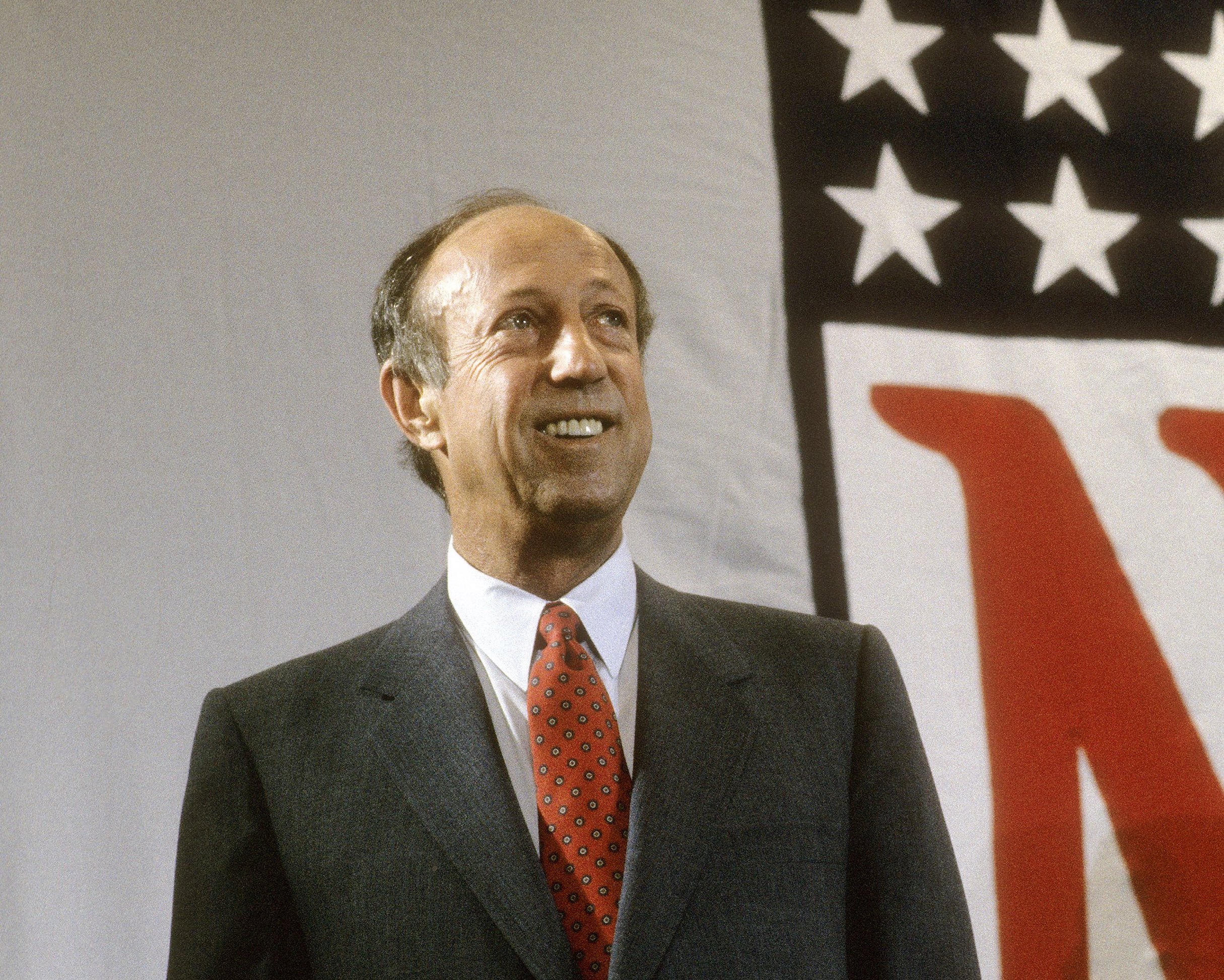
The cognitive functions and golf swings of Next TV writers Daniel Frankel and David Bloom are solidly on par with men well into their fifth decade or beyond, we can assure you.
DANIEL FRANKEL: So I’m trying to cram in three hours and 60 seconds to see Kevin Costner grumble his way through his multipart cowboy opus, Horizon. And I'm still trying to get our studio ready for its first renter … as I head up to Oakland, Calif. to spend the money on renting yet more student housing. As I get older, life is getting more complicated, not less.
But man, I have to start with the (aging) elephant in the room — Thursday night's debate, which was witnessed by 48 million viewers on CNN. And I'll channel British actor Mark Strong's monologue from Zero Dark Thirty to do it. If we thought there was some … secret cell somewhere, working to save the democracy from a vengeful, narcissistic fascist with the morals of an alley cat … Well, I want you to know that we are wrong. This is it. There’s no working group coming to the rescue. There’s nobody else, hidden away on some other floor, plotting to install Pete Buttigieg on the ticket at the DNC convention in August. There is just us … and Joseph R. Biden. And it became crystal clear on CNN Thursday night, we are failing …
I mean, forget the mental lapses … if a candidate who played golf, according to one tally, 142 days out of his roughly 1,461 days as president — about 10% of the time — starts bragging about his swing during a debate, you take your “there-you-go-again” moment and simply say, “Bro, maybe you put down the clubs a little and do the business of the American people for a change?” Instead, we got this Thursday:
DAVID BLOOM: Whoa, yikes … we’ll get to that bleak stuff in a bit, Firecracker Danny. But ahead of the somnolent July 4th holiday/week, I'd rather start with the artificial intelligence version of Al Michaels’ Hall of Fame voice that NBC will use for custom-generated video recaps to be delivered daily to Olympics fans by way of Peacock. Michaels popped up on CNBC on Friday, and said when NBC first played the voice clone he was “frightened and astonished at the same time.”
That’s an understandable sentiment when your golden tones made you rich and famous. But Michaels said he was willing to embrace the opportunity, and off we go. I think this is smart for both Michaels and NBC, which films a brain-melting amount of footage at each Olympics that never gets seen. Now the company can use some of that to create a vast array of customized newsletters for Olympics fans who like specific sports at rapid and massive scale. If they’re really smart, and I think they are, Comcast/NBCU will use the newsletter choices not only to sell highly-targeted advertising during the games, but continue to use the data for targeted ads and programming on Peacock for years to come. Like equestrian sports? Here’s National Velvet. Love the bicycling? Here’s Breaking Away. The news inspired me to tap ChatGPT’s latest version to create an image of an old-style robot announcer. It looks nothing like Al Michaels, but is still kind of cool.
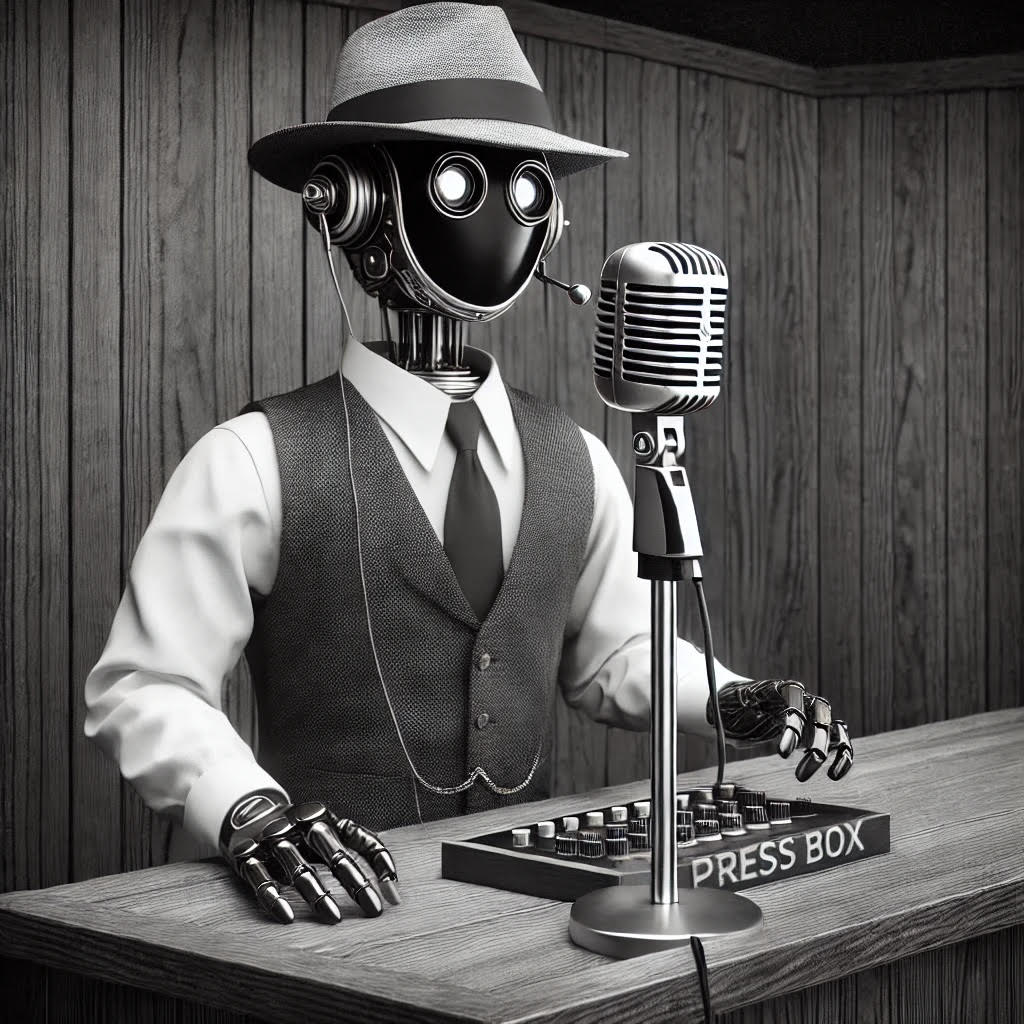
FRANKEL: Maybe it was AI that rendered Jay Penske in a keffiyeh for Thursday’s rather pointed report in Richard Rushfield's The Ankler, which detailed how one of the many media assets owned by the “motor oil heir,” SXSW, caved to pro-Palestinian protests and cut sponsorship ties with the U.S. Army. “It’s hard to overstate how unusual it is for a festival in this challenged climate to turn away a sponsor …” Rushfield noted. Most folks in Hollywood understand that Penske probably wants to keep his brands as far away from “River to the Sea” declarations as he can. (Or maybe there's more to that Saudi money than we know?) But as someone who fought the Hollywood Blog Wars a little too aggressively and personally a little over a decade back, I can't help but be at least a little entertained by Rushfield’s outsized aggression.
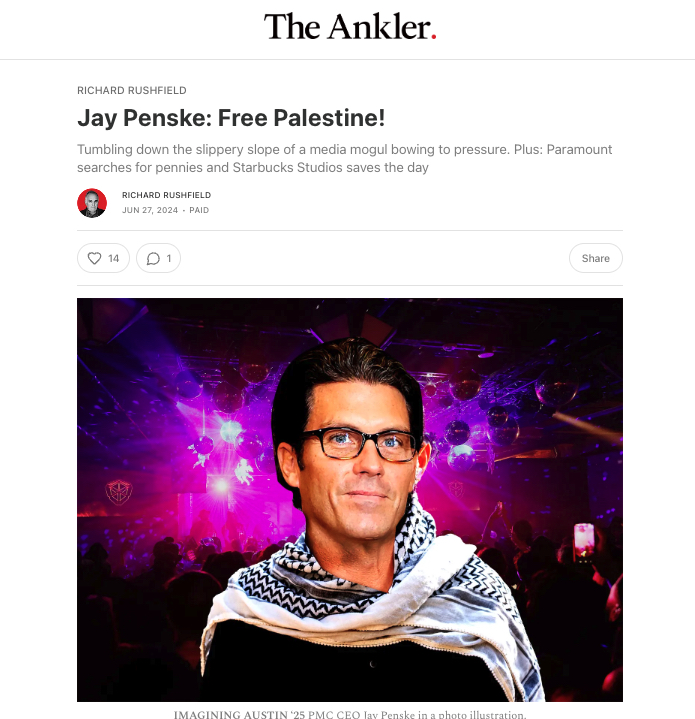
Speaking of unusual, how likely is it that the NFL ends up paying one dime in the $4.7 billion antitrust verdict just thrown at it over “NFL Sunday Ticket?”
Also read: NFL Loses Sunday Ticket Case, Ordered To Pay $4.7 Billion
BLOOM: The Sunday Ticket verdict certainly had a populist whiff, which doesn't always sustain on appellate review. Also, remember that the NFL lost a similar TV antitrust case almost four decades ago, and NFL commissioner Pete Rozelle got Congress to change the law. That seems like a real possibility once more. Then again, given a deeply polarized and immobile Congress, the erratic and revanchist originalism of our current Supreme Court and highly politicized downstream judge/clowns such as Aileen Cannon and Matthew Kacsmaryk, who knows? IBM, Microsoft and AT&T fought antitrust cases for decades. And the NFL is far more important to the nation’s mental health and cultural landscape than those insignificant little startups. Regardless, It certainly won’t change how we watch football this season or, probably, several seasons to come, which the leagues and their TV partners will surely welcome.

That's also good news for the WNBA, which just reported record TV viewership, its highest in-game attendance in 26 years, and skyrocketing jersey and merchandise sales through the season's first month. You can thank that high-profile rookie class of Caitlin Clark, Angel Reese and others.
That initial success only makes the U.S. Olympic team decision to not add Clark or Reese to the roster look more self-defeating than ever. But the team clearly puts a premium on experience; its youngest players are 26 (Sabrina Ionescu, Jackie Young) and its oldest is 42-year-old Diana Taurasi, one of the game’s all-time greats who already has five gold medals. Despite that, I'm guessing Clark and Reese will be grateful for the mid-season Olympic break, after segueing directly from a long college season and postseason directly to the league.
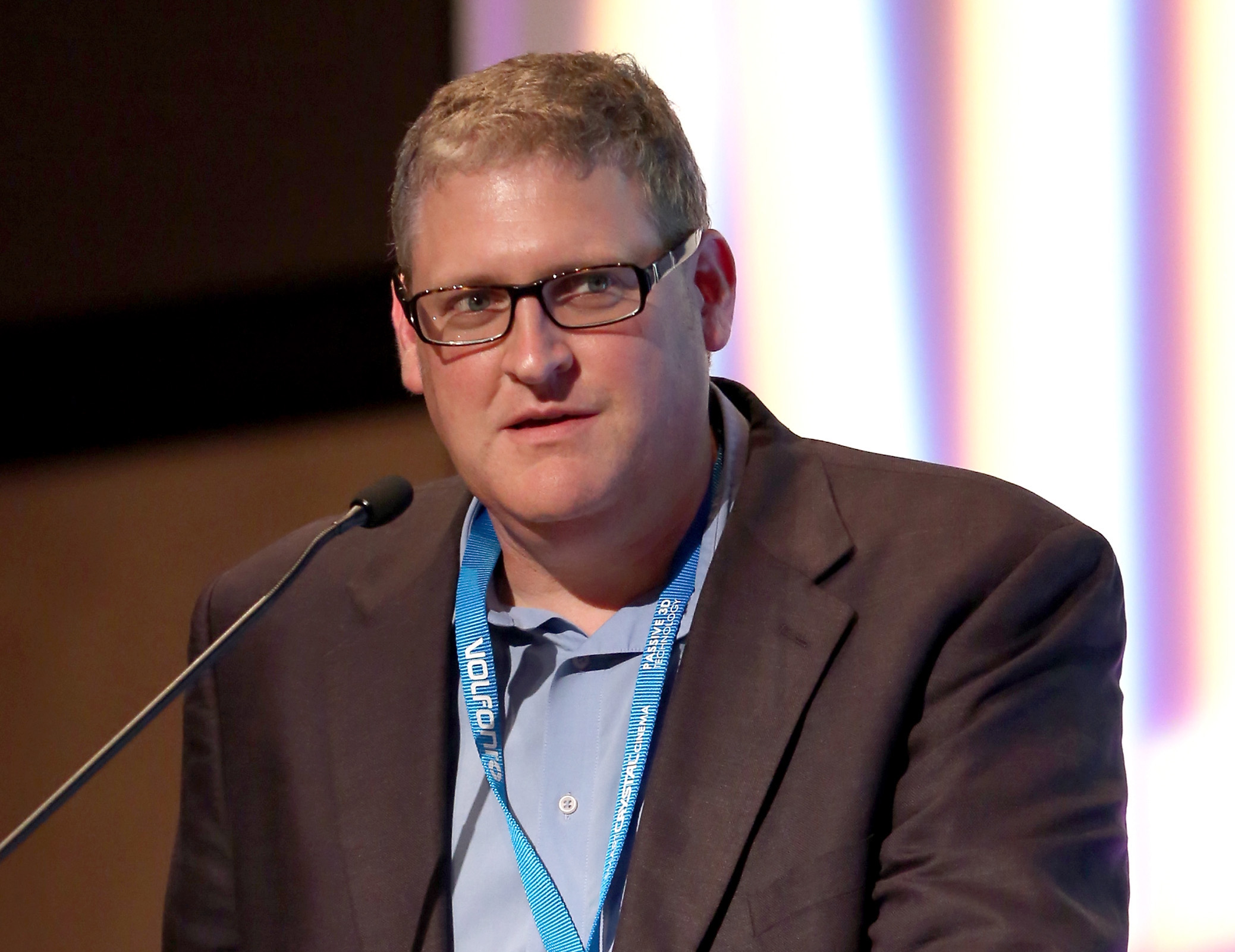
FRANKEL: I tell you what season never ends — rural fiber season. Cable lobbying group NCTA – The Internet and Television Association put together a 20-minute documentary, Every Last Mile: The Untold Story of Connecting Rural America, showcasing the challenges and hardships associated with taming the the Wild West with multi-gigabit speed. Forget Horizon. Watch this:
Separately, Ookla just released its latest report on the state of the 5G internet. T-Mobile is still the fastest gun in the West, but Verizon is catching up.
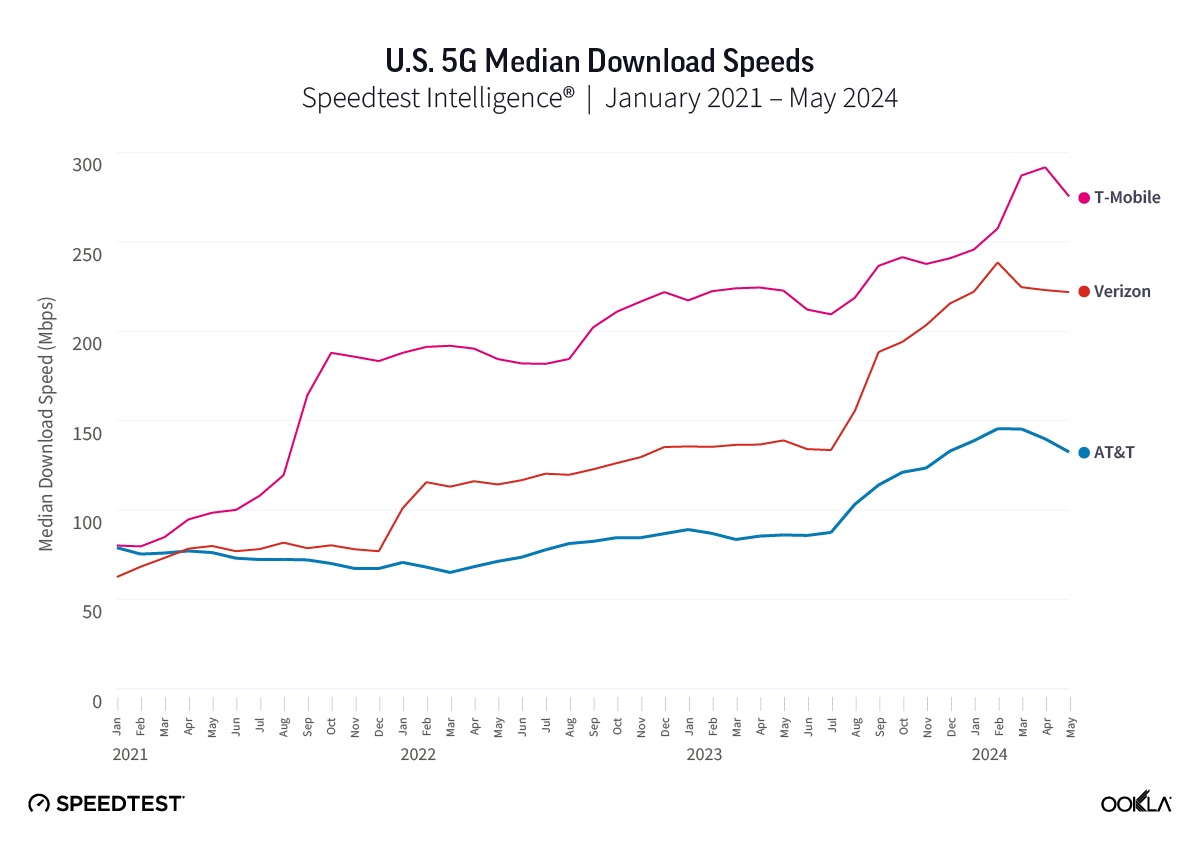
BLOOM: Actually, given the reviews (it’s three hours long, not enthralling, and just like other Costner Westerns, has white people tell you what the Native Americans are thinking), you almost certainly should forget Horizon Pt. 1. It rated only 39% on Rotten Tomatoes’ critics side, though the initial audience response has been considerably better. Whether that translates to box office during this quasi-holiday debut weekend is a gigantic question, especially with part two coming in August, and two more parts still to come after that. A bad start makes for a long difficult trail ahead, as Costner's cowboy protagonists might say. Maybe the robot film executives at Warner Bros. distribution can rebrand it an HBO project, as Warner Bros. Discovery just did with a bunch of “Max Originals,” and say it’s a prestige play/Yellowstone prequel.
The marketing campaigns to revive the rural cable buildout are, blessedly, much shorter than Horizon, though no less non-riveting, and the political warfare is likely as ferocious as anything in Horizon. As with the NFL case, I wouldn't expect much to happen with this paralyzed Congress and the complications of election-year posturing. Thank goodness everyone can go buy a smartphone (soon with AI Al Michaels!) on a T-Mobile account, hunker in their rural bunker, and watch robots play basketball or greenlight over-the-top Western movies that they can't watch through their nonexistent rural cable-TV provider.
FRANKEL: Costner received a standing ovation after screening Part 1 at Cannes. How could it be so bad? So your friends at Chicken Soup for the Soul Entertainment finally threw in the towel Saturday morning. Filed for bankruptcy in Delaware. Easy to say in retrospect, but did mining the Redbox user list ever seem like a sure customer gold mine to you?
BLOOM: No one should ever judge standing ovations for Cannes film festival entries as a reflection on the watchability, aesthetic or financial possibilities of any project. Painful history suggests there is no correlation, as Horizon again may prove. As for CSSE, it was victim to similar issues dogging Sinclair’s ill-fated foray into regional sports networks. Both made a calculated bet on an aging business model that was still generating cash and might be synergistic with their existing assets. Chicken Soup bet it could still extract value from Redbox’s 40,000 DVD rental kiosks, generating useful data about hard-to-reach audiences in the country’s less tech-savvy corners. In both cases, the bet failed spectacularly, partly because the pandemic accelerated already-shifting consumer habits. Both cases should be sharp object lessons for the private-equity mokes who want to scoop up aging media assets to extract whatever juice is left in those oranges. As usual, the price they pay amid decaying business models will determine whether they truly made a good deal. But beware. The ice underfoot is shifting rapidly.







